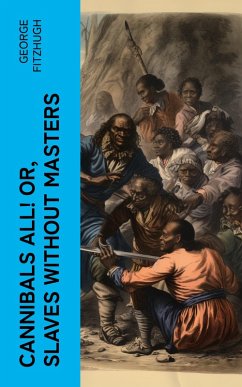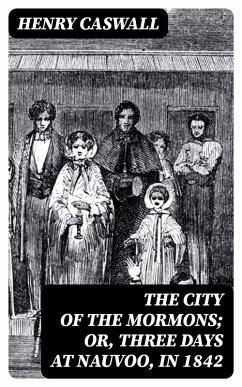
Cannibals all! or, Slaves without masters (eBook, ePUB)

PAYBACK Punkte
0 °P sammeln!
In "Cannibals All! or, Slaves Without Masters," George Fitzhugh presents a provocative examination of society, labor, and freedom, positioning Southern slavery as a more humane and just system compared to the wage slave economy of the North. Written in the mid-19th century, Fitzhugh's work utilizes polemical rhetoric and employs a biting, satirical style that challenges prevailing notions of freedom and capitalist individualism. Rooted in the antebellum South's socio-political climate, the book critiques the moral underpinnings of capitalism while advocating for the plantation system as a pate...
In "Cannibals All! or, Slaves Without Masters," George Fitzhugh presents a provocative examination of society, labor, and freedom, positioning Southern slavery as a more humane and just system compared to the wage slave economy of the North. Written in the mid-19th century, Fitzhugh's work utilizes polemical rhetoric and employs a biting, satirical style that challenges prevailing notions of freedom and capitalist individualism. Rooted in the antebellum South's socio-political climate, the book critiques the moral underpinnings of capitalism while advocating for the plantation system as a paternalistic haven amid an increasingly industrialized nation, emphasizing the interconnectedness of duty and dependency in human relationships. George Fitzhugh, an influential, albeit controversial Southern writer and social theorist, emerged from a background steeped in the cultural and economic realities of American slavery. His advocacy for a slavery-based social order was informed by his experiences and observations as a defender of Southern values during the tumultuous pre-Civil War era. Fitzhugh's writings reflect a keen intellect grappling with the socio-economic transformations of his time, striving to make sense of the complexities surrounding human labor and freedom. This compelling work is essential reading for those interested in American history, social theory, and the ideological battles that shaped the nation. It challenges readers to reconsider widely accepted definitions of freedom and to engage critically with Fitzhugh's arguments, which, while controversial, continue to resonate in discussions about labor and economic systems today.
Dieser Download kann aus rechtlichen Gründen nur mit Rechnungsadresse in A, B, BG, CY, CZ, D, DK, EW, E, FIN, F, GR, H, IRL, I, LT, L, LR, M, NL, PL, P, R, S, SLO, SK ausgeliefert werden.













